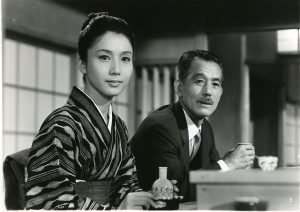Classic Cinema: An Autumn Afternoon
Directed by Yasujiro Ozu
Starring Chishu Ryu, Haruko Sugimara, Keiji Sada
Reviewed by Michael Dalton
“In principle, I follow the general fashion in ordinary manners and moral laws in serious matters, but in art I follow myself”.
Yasujiro Ozu
Of all Yasujiro Ozu’s films, the visually resplendent An Autumn Afternoon is his simplest. It is here his specific and stylised approach is at its most warm and tender, and shot through with his trademark nuances. An Autumn Afternoon is a film that sees the concerns present in all Ozu’s work comes full circle. He was once quoted as saying “Rather than tell a story I wanted to show the cycles of life” and in this film that cycle is completed with his profoundly humanistic view.
It has been said many times that Ozu is the only director in cinema history to get away with telling the same story over and over again. A slight exaggeration once you look closely, for it’s always been the details in his films that give them resonance, and slyly divert us. An Autumn Afternoon certainly recalls Late Autumn and more so, Late Spring, yet it feels as though Ozu acknowledged all his past successes and re-evaluated them here to perfect his story of patriarchal love and concern. Shuhei Hirayama (Ozu regular Chishu Ryu) is a widower with a married son, Koichi (Keiji Sada) and two children yet to be, a daughter, 24 year-old Michiko (Shima Iwashita) and the younger Kazuo (Shinichiro Mikami), who both still live at home. Along with fellow classmates Kawai (Nobuo Nakamura) and Horie (Ryuji Kita), Shuhei attends a reunion where they meet up with their old teacher Sakuma (Eijiro Tono). Accompanying Sakuma home, they meet his daughter Tomoko (Haruko Sugimara), who has stayed and looked after her father and is now a spinster.
In Chishu Ryu, Ozu found his ideal leading man, an actor of dignity and respect. Fans of Ozu’s most famous film Tokyo Story will remember him if for nothing else, his soulful, understanding eyes. He always seemed to be assessing those around him. There’s a great dignity in his acting style (he could never play a villain convincingly) and it is around him the story takes form. After meeting Tomoko, whom Sakuma realises is now a spinster due to his own selfishness, Hirayama sets about finding a suitable man for his daughter to marry before it’s too late. He investigates a colleague whom Michiko is fond of but he is already engaged so he asks his daughter if she would consider a matchmaking arrangement. Rather than weigh down the tale with further exposition, Ozu moves us forward to Michiko’s wedding day where we see her dressed in traditional robes, beautiful but apprehensive, ready to be married to an unseen groom.
The final moments of An Autumn Afternoon should suggest deep sadness when in fact it’s the result of a selfless act that brings release, and melancholy. In this, his last film (Ozu’s illness and demise was sudden), there’s a feeling of completion as he examines the nature of growing old, the peace that accompanies it and, as always, the exquisite joy of family. Despite the detail of the narrative, it’s very much of a piece and works in a rhythmic style. As always, he keeps his camera still (he never let it move which in turn confined and defined the physical tempo of his actors) and at a low angle, an angle from where he viewed his parents. He always considered kindness to be an important theme in his work and here, it underlines every frame.




